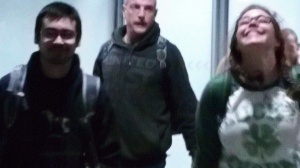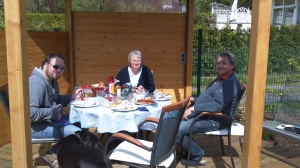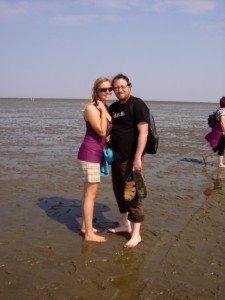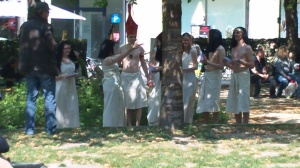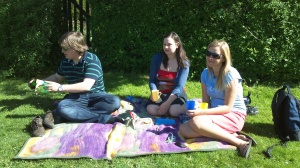This year has been, and continues to be, one of the best experiences of my life. And similar to the other best experiences of my life, this primarily means that I have cried a lot this year. Because all the best things I have done share one major thing in common, and that is they are things I had to grow into, I required time to acquire new skills and put certain, unfortunate parts of my old life to death before I could truly live into the new possibilities that came with college or leading a youth group or living in another country. The year that I first heard a call from God to a life of ministry, that was another one of those times. Lots of tears, lots of emotional hardships…and for the life of me I could not figure out how or why the more I came to understand myself, the more difficult the world seemed to be. Then I took a trip to my alma mater, Beloit College, where the campus spiritual director, Bill Conover, handed me a book by Franciscan Priest Richard Rohr, and I was introduced to some spiritual practice concepts that would end up being vital to my development as a person attempting to walk a spiritual path without losing my mind. The first of these concepts, one that would be central to my understanding of spirituality, is called Liminal Space.
to the other best experiences of my life, this primarily means that I have cried a lot this year. Because all the best things I have done share one major thing in common, and that is they are things I had to grow into, I required time to acquire new skills and put certain, unfortunate parts of my old life to death before I could truly live into the new possibilities that came with college or leading a youth group or living in another country. The year that I first heard a call from God to a life of ministry, that was another one of those times. Lots of tears, lots of emotional hardships…and for the life of me I could not figure out how or why the more I came to understand myself, the more difficult the world seemed to be. Then I took a trip to my alma mater, Beloit College, where the campus spiritual director, Bill Conover, handed me a book by Franciscan Priest Richard Rohr, and I was introduced to some spiritual practice concepts that would end up being vital to my development as a person attempting to walk a spiritual path without losing my mind. The first of these concepts, one that would be central to my understanding of spirituality, is called Liminal Space.
 So, what is Liminal Space? Allow me to introduce you to the words of Richard Rohr:
So, what is Liminal Space? Allow me to introduce you to the words of Richard Rohr:
. “Limina” is the Latin word for threshold, the space betwixt and between. Liminal space, therefore, is a unique spiritual position where human beings hate to be but where the biblical God is always leading them. It is when you have left the “tried and true” but have not yet been able to replace it with anything else. It is when you are finally out of the way. It is when you are in between your old comfort zone and any possible new answer. It is no fun. Think of Israel in the desert, Joseph in the pit, Jonah in the belly, the three Marys tending the tomb…IF YOU ARE NOT trained in how to hold anxiety, how to live with ambiguity, how to entrust and wait-you will run-or more likely you will “explain.” Not necessarily a true explanation, but any explanation is better than scary liminal space. Anything to flee from this terrible “cloud of unknowing.” Those of a more fear-based nature will run back to the old explanations. Those who love risk or hate thought will often quickly construct a new explanation where they can feel special and again in control. Few of us know how to stay on the threshold. You just feel stupid there-and we are all trying to say something profound these days…Everything genuinely new emerges in some kind of liminal space.”
The Wattensee:
So a few weeks ago, we vacationed to the north of Germany, and i mentioned here briefly that we saw something called the “Watt” otherwise known as the “Wattensee.” It is a fascinating sight for a beach, because when the tide goes out, it goes WAY out. In the morning and evening, it is a normal looking beach (insert photo here?), but in the afternoon, the sandy beach is separated from the ocean waters by several miles of mud. Apparently it is a mud flat (which is what the word “watt” means) formed some time between the 10th and 14th centuries by a series of intense storms. Over the past several hundred years, however, the unique  environmental conditions of this area have “given rise to an abundance of highly specialized forms of life,” which include “a high proportion of organic substances, which form the first link in the food chain.”
environmental conditions of this area have “given rise to an abundance of highly specialized forms of life,” which include “a high proportion of organic substances, which form the first link in the food chain.”
Vacationing there is beautiful and fun, but far from a typical, refreshing weekend at the beach. As Inka learned when trying to swim, even when the water is at high tide, resembling a normal looking beach, swimming is impossible unless you venture out six miles to where the mudflat ends. Visitors obviously don’t bother with this, especially since the water spends the majority of its day…out to sea. So you spend most of your time either sunbathing or walking around in the miles long stretch of mud. It is completey cool and completely surreal. We saw tiny, mollusk-looking things that look like they fell out of a Pirates of the Carribean movie. The field is littered with sink holes, and everyone is just wandering around aimlessly, basking in the wonder of an ocean that is…missing. Sometimes you feel like you are at the dawn of creation, other times the end of the world. You are not on the beach, you are not in the ocean…you are forever in between, in this nowhere world…where new life is born.
Sometimes you feel like you are at the dawn of creation, other times the end of the world. You are not on the beach, you are not in the ocean…you are forever in between, in this nowhere world…where new life is born.
It is a perfect geographic example of Liminal Space, and it helped me appreciate the importance of that hard-to-come-by realm. Obviously when we speak of Liminal Space we are primarily talking about a spiritual, non physical, space. But we humans need physical concepts in order to visualize and process spiritual realities. Rohr has talked about Liminal Space as a doorway, the small space you occupy when leaving one room yet not quite entering the next. It is illustrative, but it can imply that liminal space is something we encounter briefly and fleetingly. The Wattenmeer is a better example of a space that is occupied over a longer period of time, which is exactly the kind of liminal space required by folks like us who do not do well with complex, abiguous situations. For those of us who are looking for spiritual enlightenment, but held captive by a digital, 24/7 world, those whom  Rohr describes as, “those who love risk or hate thought,” we are in deep need of the new life that is formed within the space that is neither beach nor sea. And we need to recognize that these new forms require a substantial amount of time to develop…maybe months…maybe years.
Rohr describes as, “those who love risk or hate thought,” we are in deep need of the new life that is formed within the space that is neither beach nor sea. And we need to recognize that these new forms require a substantial amount of time to develop…maybe months…maybe years.
For those of us who long for something new in our lives, we need to begin finding models for Liminal Space that we can occupy long enough to give shape to the new. I suppose we could look at it this way: For those of us who long for something new in our lives, how often do we make room in our lives for new possibilities?
From the title of this blog, you can tell how essential this image of liminal space has been for my formation; actually, the entire purpose of this blog can be seen as a liminal project, documenting my journey from the life I had been living–with all my old hang ups and habits, most of which I have not really outgrown or left behind–towards Wahnfried, which is the term I have adopted for my personal goal of living in a way that is not preoccupied with escapist fantasies of the future, or illusions that suit my personal needs, but a life that seeks truth in all its messy, unattractive complications with an eye toward a future that is more just for everyone, if only a tiny bit, if only through my own choices and actions AND, ultimately, being at peace with the outcome. I am not able to go from one place to the other out of sheer willpower, nor can I do it without taking a good length of time to unlearn old habits and acquire new skills. Liminal space is the space I require in order for that to happen. It is the space that Spiritual Practice makes available to us. It is the space that I have made for myself–in a literal sense by choosing to spend a year abroad, and in a spiritual sense by starting this blog. The combination of these two things have offered new tools with which I can grow, learn, create and move forward. In sharing my journey on the web, I am challenged to be honest and accurate in my recounting of events. In offering my story to others–weather nor not anyone is interested in that story is a different matter entirely–I find an incentive to regularly (at least a weekly basis) reflect on my life and decisions. It’s an interesting tool, because I can actually look at everything from the content to the increased frequency in posting and actually measure some of the ways in which I have changed since last August. While searching for Wahnfried could be a lifelong process, there is a lot of reason to believe some new things have developed…ideas, view points, beliefs, the most basic forms of intellecutal life…that will begin to take form when I return to America in a few short months.
content to the increased frequency in posting and actually measure some of the ways in which I have changed since last August. While searching for Wahnfried could be a lifelong process, there is a lot of reason to believe some new things have developed…ideas, view points, beliefs, the most basic forms of intellecutal life…that will begin to take form when I return to America in a few short months.
But, enough about me. I mean, really. Always with the run-on sentences, this one.
Despite my blow-hardiness in this blog, EVERYONE, at some time or other, comes into contact with liminality…liminalism…liminiminima…you know. Every time something comes to an end, we are encountered with a brief period of time before something new rises in place of the old. If we apathetically cruise through our days, or if we angrily suffer the time away as victims, then we are likely to encounter a lot of old, familiar problems in the new time. But if we are attentive and reflective, if we can mull through the destruction of yesterday and see what can be salvaged, if we apply a little creativity and hope…then ordinary time is transformed into Liminal Space, and tomorrow ceases to be “just another day” and magically offers something legitimately new….for you and the world.
And the good news continues, because we actually encounter potential Liminal Space everyday, in major catastrophes and ordinary tasks. And when we look at situations that have the potential to be Liminal Space, we can also see why such space is hard to come by. It tends to come within situations that are painful, disorienting, or just plain old annoying as all get out…and these are not situations we usually enjoy occupying for any length of time.
Zum Beispiel (for example)
1. Airplanes
Ordinary Time: There is literally no end to the ways people can find to complain about traveling in an airplane. Security is ridiculous, the plane takes off late, or, like when I was coming back from America, not at all, and we are redirected to others planes and other locations. It is cramped, the food is no good, in-flight entertainment is often a not funny joke. If there is a baby on board, or if you have a stomach bug, God help you! Flight attendants are rude and/or incompetant, and people are loud and/or stupid. Not to mention that it is expensive and you spend a long time disconnected from the very important things you could be doing if you didn’t have to keep your electronic divices in the “off” position while traveling to a place you don’t want to be, and for crying out loud, how much could a text message from 5,000 feet hurt things anyway?!
much could a text message from 5,000 feet hurt things anyway?!
Liminal Space: Unless you are an astronaut, it is difficult to imagine a place a human could go that would be more removed from the constant hustle and bustle of 21st Century living than sitting in a pressurized cabin for a few hours, thousands of feet above the earth. No phone, no lights, no motor cars…although, lots of other luxuries these days, with TV and/or movies, video games, and….yeah internet sometimes. You can read, listen to music, or just sit and stare into space. Literally, if you have a window seat, you are a lot closer to space than you usually are, and you can just stare into it. And if you are traveling to a far off place, then you are even removed from time, you take off and it’s Tuesday, you land and it’s somehow the next week. This can be a space that produces a lot of anxiety and a lot of complaints. But it is also the only thing outside of a camping trip to the deep woods or a work trip to a non-industrialized country that allows you to totally shed the stressful flow of your 24/7 digital world. You have a brief window to reflect, pinpoint some areas of your life that not working in a way that is healthy for you or your community. You can literally walk off an airplane with a different rhythm to your life than you had upon boarding. Check your baggage and don’t pick it back up.
2. Graduation
Ordinary time: For the most part, graduating from anything is, to one degree or another, an acheivement worth celebrating and is usually a milestone that would not be described as “ordinary.” The temptation with milestones, though, is to live our lives from one to another. Rather than putting the emphasis on the journey (which is where we live the majority of our lives), we focus all of our attention on isolated acheivements, rather than on daily living. This keeps us constantly moving, rarely reflecting. We acquire a lot to be proud of…but are we proud about the lives we are living in order to make those acquisitions? And as joyous an occasion as a graduation can be, does it deliver what it promises, allowing us to graduate one system in order to enter a new one, or does it keep us forever striving, never satisfied, never feeling qualified, just jumping from one acheivement to another, eternally impatient and annoyed with the time in between milestones?
Liminal Space: Now adays, most of us who tend to graduate things tend to have our next thing lined up–whether it is more school or a job–before we actually have the degree. I remember the last semester of college, as everyone diligently plugged away on tests, resumes, and applications, trying to get in on the next thing before we were quite done with our current thing. I didn’t do that, and I have never been able to figure out if that is because I am naturally disorganized, woefully bad at making decisions, or just flat out lazy. But it seems to me that the parts of my personality that make me suitable for ministry make me equally unsuitable for anything else, things that require planning and auditioning and prematurly committing to a situation that I have no business being in. So as a result, I spent the summer after college living in Beloit, working for the Residential Life office, living from paycheck to paycheck with no real idea about what would happen in August. It was a great experience, even though it was as painful and stressful as it was fun. Liminal Space is typically not something we appreciate at the time, until we are trained to look for it. And the reasons we don’t appreciate it are the same reasons that it is necessary; it comes with a lot of doubt, a lot of uncertainty, and virutally no false sense of control. Graduating puts us in limbo, for better or worse. Even if we know what comes next, we usually have a brief period of time–a few days or a few months–before the next thing begins, and it is in that Limbo time that we can make some powerful decisions about what the future will look like. But only if we have the courage to tell the truth about who we are, and not give up on the things we truly want. With no system putting pressure or expecting certain things from us, we have a short opportunity to collect the pieces of our fragmented souls and mend them, and fortify them so we stand a better chance of staying strong when the next system comes along and attempts to demand everything from us.
BTW: Congratulations to The Class of 2011!
3. Jobless
Ordinary Time: It’s a situation far too many people are facing right now. When we lose our jobs, we are not just losing precious resources, we are losing our identity. For Americans this is especially true. When someone asks what we do for a living, we answer by telling who we are. I am a teacher. I am a programmer. I am an engineer. So when that is taken away…we not only have to figure out how to support ourselves and our family, we not only have to search long and hard for what comes next, we also have to figure out who that makes us. The loss of a job is the loss of…potentially everything, and the time after that is typically filled with stress and worry and desperation.
Liminal Space: It can also be a time of rebirth. Last fall I heard a lot about an organization called We’ve Got Time to Help, a network of folks who have lost their jobs, can’t find new ones and have decided to use their time to assist others in need with various projects. I haven’t been in the States much this year, so I don’t know how widely publicized this group is, but look them up immediately if you are not familiar with them…especially if you are among the nearly 20% of Americans currently out of work. I have also heard recently about Adrienne Marie Brown and the work of herself and other folks around Detroit, Michigan, developing jobs and economic systems among Detroit’s “unemployed” so that, as she put it on a recent interview on Smiley and West, “…everyone, from young people to old people, everyone is being valued for what they can contribute. Rather than their value being marked on them from external sources, that they can see themselves as a meaningful part of the community, and everything they do in the community leads to them getting the resources they need.” There is no doubt that joblessness creates a time of great stress, anxiety, and desperation, BUT those are the emotions we sit with in Liminal Space. No wonder we don’t stay there too long, who wants to live with those emotions longer than necessary? But the better we practice being in that space, the more we learn to let go of those negative feelings just enough to discover the freedom and creativity that lies underneath them. Joblessness is, in the end, being without a paycheck, which IS a problem; but that is different than not having work to do. And for some of us, especially people of faith, it sometimes takes a brief period of being without a paycheck before we learn what kind of work we are truly called to engage in.
4. Vacation/Holiday
Ordinary Time: Germany may get more “holiday” or “vacation” time than we get in America, but everyone seems to think about that time in more or less the same way; we all see it as extra time. We call it “free time,” but really it is extra time in which we typically spend a lot of money to experience new things, or reconnect with family, or just to be entertained. It usually means time off work, but it rarely means time off from our normal way of doing things, which is to consume, to spend, to pay for privileges on our time off that we are not afforded during our “time on.” We can have fun, we can do once-in-a-lifetime things, but how often do we feel genuinely recharged and revitalized by this time off before returning to the daily grind?
things, but how often do we feel genuinely recharged and revitalized by this time off before returning to the daily grind?
Liminal Space: My friend Vaughn Hillyard has always been an amazing person to talk to. I met him when he was 14, but his reading level was already way past mine. By the time he was 18 he had already started his own non-profit organization. Vaughn is an extraordinary person for many reasons, not the least of which is that he knows what a holiday is for. He recently started a blog, which you should read, and on Memorial Day last week he wrote:
“It sometimes takes these occasions and holidays to put into perspective what kind of life I live and compare it to those of others. I’m at the age where I now have former high school classmates and thousands of other men and women my age that are in the country’s armed services. Many will go to Afghanistan and Iraq. The others are on standby…I give those in the military all the credit in the world for their bravery. It’s something I could not begin to fathom being a part of. Yet, I do what I do [Journalism] because of them. They’re fighting for us and have dedicated themselves to the military to allow Americans to live a life of freedom and hope. And accordingly, that’s what I’ll continue to do. I’ll hold up my end of the deal, and I’m committed to giving this country reason to continue fighting for what’s right in the world. I’ll do everything I can to make their time and efforts worthwhile.”
It could be that this is part of the reason why Americans don’t always even take all the vacation they are given. Maybe vacations already reek too heavily of liminal space, time that can not be controlled, time that is “free” in the sense of “wasted” time or “not earning money” time. What if a vacation was more than the few days a year when we don’t work? What if it was also a few days of truly living differently than we normally do? What new things could we do and discover if we forced ourselves into the woods, or just kept our cars in the garage? What could be born from our days of remembrance if we actually took an entire day, as Vaughn did, to remember, to reflect, to honor people and causes? Sometimes you don’t have to do anything to find Liminal Space, it’s already scheduled on the calendar! All you have to do is not waste the opportunity.
5. Diet
Ordinary Time: I think I have mentioned before how my friend, Anna Tinker, bought me a book for my birthday a few years ago, the beloved Dr. Oz’s “You On a Diet.” Up until that book, my experience with diets was strictly second-hand, just watching others go through various phases of various eating regiments. I always admired the will-power involved, but even after I gained thirty pounds during my senior year “eat a whole pizza a week because of ridiculous sadness” program, I never thought a Diet was something I actually needed or wanted to do. I knew that, even if I could work a particular program, I would reach a target weight, and then…what? A lifetime without sadness pizza? I didn’t see it happening. Dr. Oz opened me up to a whole new side of dieting.
Liminal Space: This summer marks my first serious attempt at a “diet,” specifically because of Dr. Oz’s approach to dieting, which is, essentially, not about eating differently but living differently. I read this book four or five years ago (thanks again Anna!), but it took me until now to finally appreciate how to make it work because the goal is not to lose weight, or to look good, the goal is to get your body to work the way it is naturally supposed to work. And I had lived too much inside the life modernity gave me, the lifestyle that is completely counter to the You on a Diet Diet, to figure out how to make it work. Now I am seeing it for what it is, some Liminal Space born out of sheer will power and medical science. It is entering into a period of time of living the way humans were meant to live (primarilyin motion, rather than primarily sedentary) and eating the way humans are meant to eat (foods that actually make your metabolism work better, rather than foods that stop it entirely), so that after a month or two, you no longer require a “diet,” because you have something even better, a healthy life.
And, in the end, this may be the best example of what Liminal Space offers, a future where creative new possibilities replace old, debilitating patterns. What a diet should be is some self-created liminal space, where you give up your past actions and habits and attempt to grab on to some newer healthier ones. Think of the possibilities we would have for healthier living if we could practice more liminal space, if we had “diets” in gas consumption (getting more exercise instead of driving everywhere), entertainment consumption (opting for active, engaging entertainments rather than passive, sit-around-and-eat activities), and just strait up Consumerism in general, getting out of the culture that forces us, in so many ways, to identify with specific identities which must be purchased and consumed? After the disaster in Japan, Germany had a giant, collective Liminal Space experience, when weeks of protesting all throughout the country lead to Germany’s decision to get off nuclear power in the next ten years. Obviously, this raises a lot of questions, and it’s freaking a lot of people out, especially fellow European countries. But Germany is committed to giving it a try. That is on the macro level, but going completely the other way, there is a family refusing to divulge the sex of their newborn child, so that the child will develop her/his own gender identity, rather than allowing the world to decide for him/her. It is freaking a lot of people out.
And that is the thing about Liminal Space…it’s not just difficult for those inside it…it can freak out other people too. It’s uncomfortable for everyone. And that is why we don’t spend as much time there as we ought to. Give it a try. Create something new in your life. Freak some people out, including yourself.
freak out other people too. It’s uncomfortable for everyone. And that is why we don’t spend as much time there as we ought to. Give it a try. Create something new in your life. Freak some people out, including yourself.
I’ll be home soon, America. But not too soon.





























